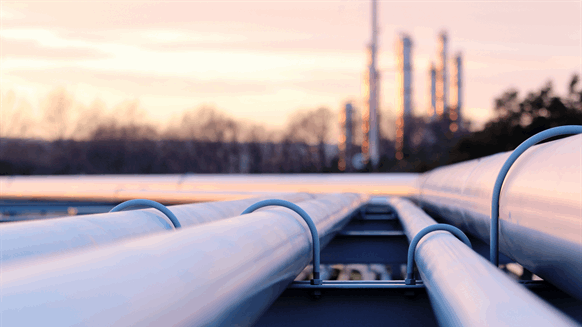Trump Admin Eyes Limiting States' Powers to Block Pipelines

(Bloomberg) -- The Trump administration is considering taking steps to limit the ability of states to block interstate gas pipelines and other energy projects, according to three people familiar with the deliberations.
The effort, possibly done through an executive order, is aimed chiefly at states in the Northeast U.S., where opposition to pipeline projects has helped prevent abundant shale gas in Pennsylvania and Ohio from reaching consumers in New York and other cities.
New York used a Clean Water Act provision to effectively block the construction of a natural gas pipeline being developed by Williams Partners LP to carry Marcellus shale gas 124 miles (200 km) to New England. The project got the green light from the Federal Energy Regulatory Commission but ran into obstacles in New York, where regulators denied a water quality permit.
While mostly targeted toward boosting limited pipeline capacity in the Northeast, the initiative could help drive permitting and construction of other energy projects, including coal export terminals. For instance, Lighthouse Resources’ proposed coal export terminal in Longview, Washington, was ensnared when the state’s Department of Ecology denied a critical Clean Water Act permit, citing concerns about air quality and increased railroad traffic to serve the site.
The new initiative dovetails with expectations that President Donald Trump would use his State of the Union address to tout efforts to accelerate permitting and construction of oil and gas pipelines, though he’s postponed the speech and the exact timing of any announcement remains unclear.
The potential White House action was earlier reported by Politico.Pipeline advocates who say states are abusing their authority under the Clean Water Act have advanced ideas for reining it in.
“It just never made sense to me that a state could be able to use the Clean Water Act and effectively veto a federally approved project,” Dena Wiggins, president of the Natural Gas Supply Association, said during an event on Thursday. “There’s got to be something to done to address that issue.”
But it’s not clear how much -- if at all -- an executive order could curtail states’ special powers under the statute. Industry officials said real change may require legislation to alter the statute itself, such as a bill advanced in 2018 by Senator John Barrasso, a Wyoming Republican.
Keystone XL
A previous attempt to use executive power to help TransCanada Corp.’s Keystone XL pipeline and Energy Transfer Partners’ Dakota Access Pipeline didn’t jump-start their construction.
The issue, pipeline advocates say, is especially pronounced in the Northeast, where there isn’t enough capacity to send gas to New York City and other metropolitan areas in times of heavy demand. Energy Secretary Rick Perry has invoked the idea of using national security grounds to justify action on the issue.
“If a polar vortex comes into the Northeast part of the country, or a cyberattack, and people literally have to start making decisions on how to keep their family warm or keep the lights on, at that time, the leadership of that state will have a real reckoning. I wouldn’t want to be the governor of that state facing that situation,” Perry said last summer at the World Gas Conference in Washington. “We have to have a conversation as a country. Is that a national security issue that outweighs the political concerns in Albany, N.Y.?”
To contact the reporters on this story: Ari Natter in Washington at anatter5@bloomberg.net; Jennifer A. Dlouhy in Washington at jdlouhy1@bloomberg.net. To contact the editors responsible for this story: Jon Morgan at jmorgan97@bloomberg.net Elizabeth Wasserman, Ros Krasny.
WHAT DO YOU THINK?
Generated by readers, the comments included herein do not reflect the views and opinions of Rigzone. All comments are subject to editorial review. Off-topic, inappropriate or insulting comments will be removed.
- How Likely Is an All-Out War in the Middle East Involving the USA?
- Rooftop Solar Now 4th Largest Source of Electricity in Australia
- US Confirms Reimposition of Oil Sanctions against Venezuela
- EU, Industry Players Ink Charter to Meet Solar Energy Targets
- Analyst Says USA Influence on Middle East Seems to be Fading
- Russian Ships to Remain Banned from US Ports
- Brazil Court Reinstates Petrobras Chair to Divided Board
- EIB Lends $425.7 Million for Thuringia's Grid Upgrades
- Var Energi Confirms Oil Discovery in Ringhorne
- Seatrium, Shell Strengthen Floating Production Systems Collaboration
- An Already Bad Situation in the Red Sea Just Got Worse
- What's Next for Oil? Analysts Weigh In After Iran's Attack
- USA Regional Banks Dramatically Step Up Loans to Oil and Gas
- EIA Raises WTI Oil Price Forecasts
- How Likely Is an All-Out War in the Middle East Involving the USA?
- Venezuela Authorities Arrest Two Senior Energy Officials
- Namibia Expects FID on Potential Major Oil Discovery by Yearend
- Oil Markets Were Already Positioned for Iran Attack
- Is The Iran Nuclear Deal Revival Project Dead?
- Petrobras Chairman Suspended
- Oil and Gas Executives Predict WTI Oil Price
- An Already Bad Situation in the Red Sea Just Got Worse
- New China Climate Chief Says Fossil Fuels Must Keep a Role
- Oil and Gas Execs Reveal Where They See Henry Hub Price Heading
- Equinor Makes Discovery in North Sea
- Macquarie Strategists Warn of Large Oil Price Correction
- DOI Announces Proposal for Second GOM Offshore Wind Auction
- Standard Chartered Reiterates $94 Brent Call
- Chevron, Hess Confident Embattled Merger Will Close Mid-2024
- Analysts Flag 'Remarkable Feature' of 2024 Oil Price Rally


